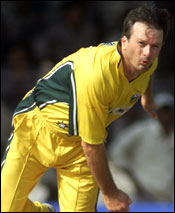For South Africa, slow is sure
Daniel Laidlaw
Listening to South Africa captain Shaun Pollock on the current tour of the West Indies, one receives the impression that South Africa is a team playing
positive cricket. Pollock has regularly expressed his team's intent to win
every match it plays, its desire to attack, and so forth. In short, he
sounds similar to his Australian counterpart, Steve Waugh. There is,
however, one crucial difference. While both skippers extol the virtues of
positive cricket, Australia actually plays it while South Africa does not.
 Despite the loss to India, South Africa is widely acknowledged as Australia's closest rivals and the series between these sides in Australia next season
is sure to be intriguing. If it contains the kind of thrilling cricket
witnessed in India, it is doubtful it will be due to South Africa.
Despite the loss to India, South Africa is widely acknowledged as Australia's closest rivals and the series between these sides in Australia next season
is sure to be intriguing. If it contains the kind of thrilling cricket
witnessed in India, it is doubtful it will be due to South Africa.
Against the West Indies last season, Australia won 5-0, with two victories
inside three days and one in four. Steve Waugh is on record as saying
Australia aims to win every match inside four days and uses the fifth one in
case something goes wrong. Arrogant or not, it is an audacious policy sure
to produce attractive cricket as each match progresses quickly. By batting
with a high level of urgency, which carried an inherent degree of risk,
Australia did not produce the massive totals one might expect against an
under strength attack, but it did take control of most matches through
expediting the state of the game.
In contrast, the current series between the West Indies and South Africa has
been laborious. While the Tests have been closely fought and gripping, the
rate of scoring and style of play has often been soporific. Admittedly,
pitches have a large influence on the kind of cricket played. But the slow
nature of play is not unique to this series alone. South Africa generally
engage in a grinding style of cricket wherever they play.
 Part of the blame must also be attributed to the opposition. It takes two
teams to create a dynamic contest and the West Indies, desperately trying to
defend its home record, has far from set the world alight. Despite this, it
is the superior teamís responsibility to set the tone of play and South
Africa have continually been content to drift in a defensive slumber, most
notably while batting.
Part of the blame must also be attributed to the opposition. It takes two
teams to create a dynamic contest and the West Indies, desperately trying to
defend its home record, has far from set the world alight. Despite this, it
is the superior teamís responsibility to set the tone of play and South
Africa have continually been content to drift in a defensive slumber, most
notably while batting.
When Steve Waugh said Australia is the only team that attempts to win every
match it plays, he did not mean every other team enters a match with the
intention of drawing it. Every team plans to win but it is the way in which
it pursues that objective that sets Australia apart from the rest.
Of late, Australiaís cricket has been characterised by its intent upon
victory at all times. South Africa, on the other hand, prefers to first
secure a position from which it cannot lose before aggressively seeking
victory. There is a major difference.
There are essentially two schools of thought on this philosophy. One is that
if you grind the opposition into a position from which they can only draw,
it has a negative psychological affect on them that enhances your chances of
victory. The other is that if the opposition retain a realistic hope of
winning, they are more than likely to give you an opportunity to defeat them
by taking risks. One is a defensive philosophy while the other is
pro-active. Itís easy to see which one is more exciting to watch.
Take the third Test in Barbados, for example. Having previously affirmed his
intention to play positively, South African captain Shaun Pollock freely
admitted afterwards that he wanted to bat West Indies out of the game before
declaring. First of all, no team makes 265 to win in little more than a
session on the last day of a Test. If it attempts to do so, then it is only
to the bowling teamís advantage. Secondly, there was no way a fragile West
Indies were ever going to score 265, even with Brian Lara. Crawling at less
than 2 runs per over for the majority of the second innings before belatedly
declaring is not the definition of positive cricket.
Consequently, South Africa cost itself victory in that match by failing to
allow itself enough time to press for a win. Pollock could have declared
earlier and won with time to spare, but he only secured a tense draw through
an unfounded fear of failure. At least he led by personal example with a
comparatively brisk 40 from 97 balls.
In the fourth Test, which South Africa won to claim the series after a
sensible declaration 322 runs in front halfway through day four, an
appalling 132 runs were scored on the third day, the second-lowest scoring
day ever in West Indies. Leg-spinner Dinanath Ramnarine was reported to have
bowled defensively into the rough outside leg stump, but did the South
African batsmen do anything to counteract that line? Weíve seen with Shane
Warne in India recently how batsmen can force a spinner bowling outside leg
to change tactics by using their feet. South African batsmen are rarely
prepared to do that.
It is one thing for a lowly team like Zimbabwe, or even the improved
England, to adopt a conservative attitude. Attempting to match superior
opponents blow for blow could lead to disaster, so it is understandable for
them to exercise a safety-first method. South Africa, though, are rightly
regarded as the second best team in the world. Their depth in batting is the
envy of all other nations and their varied and world-class pace battery is
ferocious. They possess the ingredients to play attractive cricket but
instead wilfully undertake a dull, grinding approach.
A conservative team can defeat a positive team, which the conservative team
views as vindication of its style of play. But a positive team, while it
will sometimes lose, is guaranteed to be better to watch. Regardless of its
historic victory in West Indies, if South Africa remain so defensive they
may be in for a rude shock when they tour Down Under later this year.
Mail Daniel Laidlaw